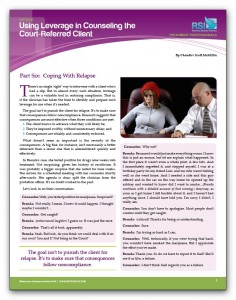 Coping With Relapse
Coping With Relapse
There’s no single ‘right’ way to intervene with a client who’s had a slip. But in almost every such situation, leverage can be a valuable tool in restoring compliance. That is, if the clinician has taken the time to identify and prepare such leverage for use when it’s needed.
The goal isn’t to punish the client for relapse. It’s to make sure that consequences follow noncompliance.
Using Leverage in Counseling the Court-Referred Client -More from this series:
- Using Leverage in Counseling the Court-Referred Client
- Using Leverage in Counseling the Court-Referred Client, Part 1
- Using Leverage in Counseling the Court-Referred Client, Part 2
- Using Leverage in Counseling the Court-Referred Client, Part 3
- Using Leverage in Counseling the Court-Referred Client, Part 4
- Using Leverage in Counseling the Court-Referred Client, Part 5
- Using Leverage in Counseling the Court-Referred Client, Part 6
- Using Leverage in Counseling the Court-Referred Client, Part 7
- Using Leverage in Counseling the Court-Referred Client, Part 8
- Using Leverage in Counseling the Court-Referred Client, Part 9










